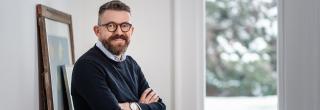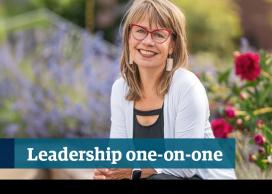Adriaan de Jager is UBC’s Associate Vice-President, Government Relations and Community Engagement. In this role, he works with municipal, regional, provincial, and federal levels of government to promote strategic relations, advance key priorities and communicate UBC’s vision. He also works to support the building of respectful relationships with community partners through scholarship, research, and public engagement opportunities.
Born in the Netherlands, Adriaan has traveled widely and has worked and studied in the U.K., the Balkans and Central America. Prior to joining UBC, he worked and studied abroad supporting international humanitarian relief efforts, reconciliation and reconstruction. He is also a former board member of the United Nations Association and past Chair of the national Government Relations Officer Network.
Q1. What quality do you most admire in a leader?
ADJ: Vision, integrity, and drive. You have to know where you want to go, be respectful and supportive of those around you along the way, and possess the drive to reach your end goals. To me, these three elements are crucial for meaningful and long-term impact.
Q2. What makes you laugh?
ADJ: I like the ridiculous, and turning convention on its head. Perversely, I also like social awkwardness and when people can puncture self-importance. That makes me laugh a lot. Ricky Gervais and Sarah Millican are two of my favourite comedians — they observe the world, point out the ridiculous, and ‘take the mickey’ out of others in a clever and playful way.
Q3. Who inspires you, and why?
ADJ: I’m inspired by people who, regardless of the hand they’ve been dealt (be it physical challenges, struggles with mental health, socio-economic challenges, or being disenfranchised in some way) keep going.
I look at my father who has struggled his entire life with mental health challenges, emigrated from Holland when he was 30, didn’t know the country, didn’t speak the language, navigated culture shock, and yet despite everything, he kept going — I think that’s pretty inspiring. He was a master butcher in the Netherlands and a respected tradesperson in Europe, but that didn’t necessarily translate when he came to Canada in the late 70s. He had to start anew, adapt to foreign ways of life, and build a solid foundation for his family from the ground up.
Q4. For you, what makes UBC different?
ADJ: UBC is, without question, a globally significant institution. You don’t need to look at rankings to figure that out. If you look at citations, research dollars, discoveries — and perhaps most importantly, impact — it’s there!
UBC attracts amazing faculty, staff, and students — I think people come here for the environment, the location, and the belief that they will be supported and encouraged to make a meaningful impact in their respective fields. I think that’s what sets UBC apart.
It’s also an exciting place. We have the opportunity to meet people across an immense range of fields who are pushing the boundaries of what we think we know about the world and our current reality. They’re questioning what it means to be a human being, what it means to live in society, and what it means to live on this planet.
Q5. What is the most important lesson you’ve learned, in your career to date?
ADJ: Speak your truth and be ready to offer your best professional advice, however challenging that may be. I’ve been privileged to work with some amazing leaders who have encouraged — and expected — that authentic voice. That has completely shaped how I work today and is the reason, I think, I am where I am. I suppose, it’s also inspired by the old public service motto of “fearless advice and loyal implementation.” It’s an approach I hope I’m cultivating with my teams.
Q6. How do you like to recharge?
ADJ: I’m a regular at the gym, and I love to cook — I’m partial to French cuisine and other European comfort dishes — the two are a good counterbalance: butter and cream vs. squats and curls. I enjoy attending the opera and seeing live classical music. I’m also an avid reader. I’m reading Yuval Harari’s Sapiens, which is pretty thought-provoking, and just started The Dry by Jane Harper.
Q7. What is the best advice you were ever given?
ADJ: I recently heard Henry Winkler — yes, ‘the Fonz’ — on NPR and he noted his guideposts through life have been tenacity and gratitude. That really resonated with me. Tenacity gets you where you want to go, and gratitude reminds you never to take things for granted.
Growing up in a working-class immigrant family that was markedly different from the families around me, I started recognizing the efforts, actions and sacrifices that my parents made over the years. Rather than appeasing the broader culture in which they found themselves, they chose to do their own thing with courage and resilience.
Q8. What do you value in your colleagues?
ADJ: Trust. Having trust in others, and similarly, knowing they can trust me.
Within a team, trusted relationships can produce amazing results. Equally, when things don’t go to plan, or go off the rails, knowing your colleagues have your back (and vice versa), is invaluable.
Additionally, I would say that I value a shared sense of purpose — to achieve the goals we’ve set out together and, when things get ‘squirrely’, to commiserate and then find a suitable path forward. All of this requires a great deal of mutual trust.
Q9. What do you hope will be your lasting impact at UBC?
ADJ: In Government Relations, I hope we are ensuring our researchers and students are supported with the necessary funding, resources, policies, and programs to thrive.
Our job is to promote the value, the importance, and the impact of what we do at this place — speaking to senior levels of government (primarily Provincial and Federal) and articulating why their support is so integral. We need to make connections or draw links to a government’s priorities, whatever they may be at any given time.
Some recent successes include, the government’s support of the Fundamental Science Review, the Canada First Research Excellence Fund, and the province’s recent investment in tech seats.
On the Community Engagement side, I really hope that UBC can be seen as a leader among research-intensive universities, for its celebration, respect for, and support of community engagement as an academic priority.
Q10. If you could have a super power, what would it be?
ADJ: Telepathy — I would love to be able to read people’s minds! Since direct communication is not a particular hallmark of our Canadian culture, we tend to perform a lot of social rituals (the proverbial ‘tap dancing’) to try to tease out what people actually mean and what they’re trying to say.
I think it would be a huge asset — but yes, with great power comes great responsibility.
Q11. How does Government Relations and Community Engagement strengthen the university’s impact locally, and within British Columbia?
ADJ: UBC’s existence is predicated on a social contract with the broader society. We exist — and have the financial and policy supports we do — because society believes there’s a value in having institutions, like UBC, deliver our academic mandate of research and learning.
Our job — particularly from the Government Relations side, but also in part through public engagement, like UBC Connects — is to communicate our value and benefit to society and, in turn, continue to garner support for ongoing investments into institutions like ours. We’re here, thanks to the support of the society in which we find ourselves. How we engage and communicate in communities — locally, provincially, federally — is critical to our existence.
Additionally, for Community Engagement, our goal is to support and elevate community-based scholarship and community-based research work. I think that’s integral work and I hope we continue to facilitate networks, create connections with community partners, and build relationships with people across and beyond the confines of our campus.
Q12. UBC is collaborating with other post-secondary institutions in a Canadian pilot project to adopt the Carnegie Community Engagement Classification. What does this mean for the university?
ADJ: I believe that a lot of folks misinterpret community engagement as strictly volunteerism and philanthropy, and aren’t necessarily aware of community engagement within the academy. The Carnegie classification seeks to apply academic rigour and an assessment of the various community engagement initiatives of an institution. One of the core goals of Carnegie, is that it not only seeks to understand the community engagement work underway, but also to elevate it.
The current Carnegie classification is a US-based classification system and we’ve already flagged a few issues that don’t translate to the Canadian context. For example, the American classification system has no indigenous context whatsoever. We also have a very different post-secondary landscape in this country and we have a very different healthcare landscape compared to the United States. This pilot process will assess the efficacy of the Carnegie classification, highlight the elements we want to adopt, and determine how we might develop a Canadian-made classification, either with Carnegie or as a standalone.
It’s exciting, it’s interesting, it’s challenging, and we’ll see where it takes us. I still think the potential of UBC is amazing and I believe that our best days are still ahead of us.
Published: February 1, 2020
Interviewed by: Rivka Parris, UBC Internal Communications



